In our DIY health series, I’ve been exploring whethe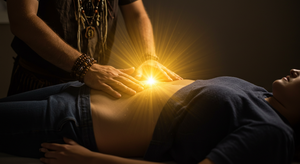 r your upper GI tract is underperforming. If it is, the first step is to support its function by adding hydrochloric acid, enzymes, or bile salts. Now, let’s talk about how we can restore normal functioning. While supplements might be helpful initially, our goal should be for our body to work well without external support. Can we achieve this? It depends on the underlying cause. As I mentioned last week, once the gallbladder is filled with stones, it seems like the body can’t reverse the damage. But if we can identify and address issues early on in the upper GI, we can often reverse the damage and get things back on track. r your upper GI tract is underperforming. If it is, the first step is to support its function by adding hydrochloric acid, enzymes, or bile salts. Now, let’s talk about how we can restore normal functioning. While supplements might be helpful initially, our goal should be for our body to work well without external support. Can we achieve this? It depends on the underlying cause. As I mentioned last week, once the gallbladder is filled with stones, it seems like the body can’t reverse the damage. But if we can identify and address issues early on in the upper GI, we can often reverse the damage and get things back on track.
Let’s start with the esophagus and stomach. Reflux is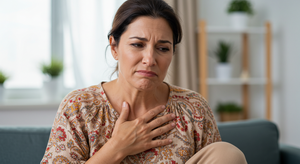 a common issue these days. It happens when the valve at the top of the stomach, where the esophagus meets the stomach, doesn’t close properly. The strong acid in the stomach triggers it to close and stay closed except when food enters the stomach from the mouth. If the acid isn’t strong enough, you get acid reflux. Three main things can make stomach acid weak: stress, infection, and not getting specific nutrition. When you’re stressed, the vagus nerve that tells your stomach to make acid gets shut off. If you have an H. pylori infection in your stomach, acid production gets turned off. If you’re low in zinc or B12, your stomach can’t make enough acid. So, while you might need hydrochloric acid tablets for a while, the real goal is to fix the problem at the root. We have muscle testing in the office that can help us identify these issues. a common issue these days. It happens when the valve at the top of the stomach, where the esophagus meets the stomach, doesn’t close properly. The strong acid in the stomach triggers it to close and stay closed except when food enters the stomach from the mouth. If the acid isn’t strong enough, you get acid reflux. Three main things can make stomach acid weak: stress, infection, and not getting specific nutrition. When you’re stressed, the vagus nerve that tells your stomach to make acid gets shut off. If you have an H. pylori infection in your stomach, acid production gets turned off. If you’re low in zinc or B12, your stomach can’t make enough acid. So, while you might need hydrochloric acid tablets for a while, the real goal is to fix the problem at the root. We have muscle testing in the office that can help us identify these issues.
Have you considered the possibility of a pancreas issue? What can we do to improve the flow of enzymes from t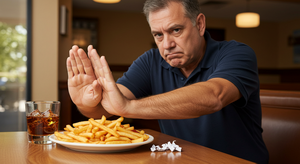 he pancreas? Just like in the stomach, the vagus nerve controls the production of enzymes in the pancreas. Any way we can reduce stress that shuts down our vagus nerve will be beneficial for the pancreas. Additionally, the pancreas is easily inflamed, so avoiding inflammatory foods like fried foods, alcohol, and smoking is a big help. Eating smaller meals can also relieve some of the stress on the pancreas. Taking anti-inflammatory antioxidant herbs like curcumin (from turmeric) and omega-3 fats like krill oil can improve pancreas functioning. Caffeine has been shown to irritate the pancreas. Digestive enzyme supplements may be necessary initially, but the goal is to get that pancreas doing its job again. he pancreas? Just like in the stomach, the vagus nerve controls the production of enzymes in the pancreas. Any way we can reduce stress that shuts down our vagus nerve will be beneficial for the pancreas. Additionally, the pancreas is easily inflamed, so avoiding inflammatory foods like fried foods, alcohol, and smoking is a big help. Eating smaller meals can also relieve some of the stress on the pancreas. Taking anti-inflammatory antioxidant herbs like curcumin (from turmeric) and omega-3 fats like krill oil can improve pancreas functioning. Caffeine has been shown to irritate the pancreas. Digestive enzyme supplements may be necessary initially, but the goal is to get that pancreas doing its job again.
Last week, I talked about how bitter herbs and gre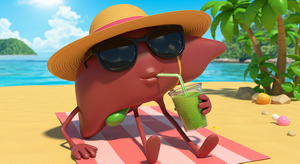 ens can help thin out bile from the liver, which is good for both the liver and the gallbladder. Today, I want to take that even further. The liver does over 800 different biochemical things for our bodies. It has six different pathways just for breaking down poisons and toxins to get rid of. But our modern diet usually overworks the liver and never gives it a chance to rest, recover, and get rid of all the bad stuff it collects each day. In our modern food supply, there are over 10,000 chemicals that have been added to our foods in the last 50 years that never even existed a century ago. The liver has to detox and get rid of all that stuff. The liver pretty much did its job quietly and in the background throughout most of human history. But now it needs some special care. We’re expecting it to do much too much. ens can help thin out bile from the liver, which is good for both the liver and the gallbladder. Today, I want to take that even further. The liver does over 800 different biochemical things for our bodies. It has six different pathways just for breaking down poisons and toxins to get rid of. But our modern diet usually overworks the liver and never gives it a chance to rest, recover, and get rid of all the bad stuff it collects each day. In our modern food supply, there are over 10,000 chemicals that have been added to our foods in the last 50 years that never even existed a century ago. The liver has to detox and get rid of all that stuff. The liver pretty much did its job quietly and in the background throughout most of human history. But now it needs some special care. We’re expecting it to do much too much.
To get my liver back on track, I’ve started a two-day l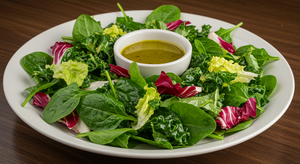 iver cleanse every week. On Thursdays and Fridays, I skip carbs and proteins and only eat green salads and veggies with a light oil- and vinegar-based dressing. This helps my liver make more bile and gives my body the fiber it needs to get rid of the bile. Eliminating the carbs and proteins takes a lot of stress off the liver while while supporting the breakdown and recycling of old dysfunctional liver cells. I also take beet leaf tablets to boost the cleanse. If I think I have a specific toxic load, I take supplements or foods to help me deal with it. For instance, cilantro is great for getting rid of heavy metals. To rebuild my liver, I use milk thistle, which has been shown to improve liver function in many studies. Of course, I’ll also be drinking more water to flush out all the junk in my body. iver cleanse every week. On Thursdays and Fridays, I skip carbs and proteins and only eat green salads and veggies with a light oil- and vinegar-based dressing. This helps my liver make more bile and gives my body the fiber it needs to get rid of the bile. Eliminating the carbs and proteins takes a lot of stress off the liver while while supporting the breakdown and recycling of old dysfunctional liver cells. I also take beet leaf tablets to boost the cleanse. If I think I have a specific toxic load, I take supplements or foods to help me deal with it. For instance, cilantro is great for getting rid of heavy metals. To rebuild my liver, I use milk thistle, which has been shown to improve liver function in many studies. Of course, I’ll also be drinking more water to flush out all the junk in my body.
Certain foods can wreak havoc on your liver. Sugar, especially the fructose part, is a major culprit. So are heated v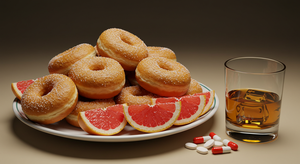 egetable oils, like those used for cooking. Interestingly, grapefruits can block some of the liver’s detox pathways, especially those that break down medications. Of course, alcohol is a well-known liver-damager. Back in the day, it was the top cause of liver damage. But now, Tylenol (acetaminophen) has taken over that spot. It’s estimated that Tylenol kills over 200,000 livers in America each year. On the bright side, there’s this new supplement called C15 that’s said to help reverse liver damage. We have it in the office at a fraction of the price you’ll find anywhere else (it’s also advertised as Fatty 15). egetable oils, like those used for cooking. Interestingly, grapefruits can block some of the liver’s detox pathways, especially those that break down medications. Of course, alcohol is a well-known liver-damager. Back in the day, it was the top cause of liver damage. But now, Tylenol (acetaminophen) has taken over that spot. It’s estimated that Tylenol kills over 200,000 livers in America each year. On the bright side, there’s this new supplement called C15 that’s said to help reverse liver damage. We have it in the office at a fraction of the price you’ll find anywhere else (it’s also advertised as Fatty 15).
Hey, let’s face it, we’ve created our own health crisis. 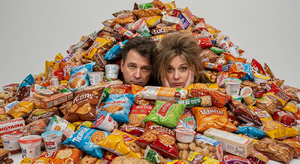 The constant stress and the processed foods we eat are taking a toll on our well-being. To be healthy, we need to relax and eat simple, fresh foods. No need for all those weird food chemicals that make food taste so good but are bad for us. And let’s not forget about microplastics in our food and drinks. Our poor liver can’t handle all that! The constant stress and the processed foods we eat are taking a toll on our well-being. To be healthy, we need to relax and eat simple, fresh foods. No need for all those weird food chemicals that make food taste so good but are bad for us. And let’s not forget about microplastics in our food and drinks. Our poor liver can’t handle all that!
Parasites are a common concern for many people, b ut are they a real problem? Well, yes, they can be! Are they a big problem in the USA? Not really. My parasitology professor in chiropractic school was from South Africa and had slides of some really nasty parasite infections in patients. But parasites are more of a tropical climate problem. Our bodies have evolved to handle most parasite concerns fairly well. In fact, there are some concerns that our modern hygienic lifestyle has eliminated parasites so well that the part of our immune system that’s supposed to deal with these issues ends up turning on us, creating autoimmune diseases since there’s nothing else for it to do. In some countries, an effective remedy for autoimmune disease is actually to give parasites to the autoimmune patient. If you’re concerned about parasites, I recommend doing a parasite stool test to see if it’s an issue for you. The new genetic marker tests are far more accurate than the old-style tests. ut are they a real problem? Well, yes, they can be! Are they a big problem in the USA? Not really. My parasitology professor in chiropractic school was from South Africa and had slides of some really nasty parasite infections in patients. But parasites are more of a tropical climate problem. Our bodies have evolved to handle most parasite concerns fairly well. In fact, there are some concerns that our modern hygienic lifestyle has eliminated parasites so well that the part of our immune system that’s supposed to deal with these issues ends up turning on us, creating autoimmune diseases since there’s nothing else for it to do. In some countries, an effective remedy for autoimmune disease is actually to give parasites to the autoimmune patient. If you’re concerned about parasites, I recommend doing a parasite stool test to see if it’s an issue for you. The new genetic marker tests are far more accurate than the old-style tests.
For our DIY health program, the first steps are sim ple: eating well, managing stress to boost our vagus nerve, doing occasional detoxes to cleanse our bodies, and getting the right nutrients from supplements and whole foods. Digestion is the key to health, and it’s all within our control. We don’t need medical visits to do this ourselves. It’s all safe and doable. It does mean making some changes in our lives. We need to prioritize feeling good and being able to do what we want to do more than we do convenience and masking our feelings with “food drugs.” Unfortunately, being healthy is no longer the norm. Most people are sick in one or more ways. We’ve become addicted to the convenient food poisons that taste so good. We like our better living thr ple: eating well, managing stress to boost our vagus nerve, doing occasional detoxes to cleanse our bodies, and getting the right nutrients from supplements and whole foods. Digestion is the key to health, and it’s all within our control. We don’t need medical visits to do this ourselves. It’s all safe and doable. It does mean making some changes in our lives. We need to prioritize feeling good and being able to do what we want to do more than we do convenience and masking our feelings with “food drugs.” Unfortunately, being healthy is no longer the norm. Most people are sick in one or more ways. We’ve become addicted to the convenient food poisons that taste so good. We like our better living thr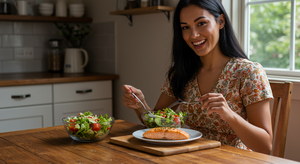 ough chemistry diet. The problem is that diet makes us sick. It makes us feel bad and it takes away our ability to physically do what we want to do. DIY health means change. ough chemistry diet. The problem is that diet makes us sick. It makes us feel bad and it takes away our ability to physically do what we want to do. DIY health means change.
Ellen has been trading sessions with the hypnotherapist Yvonne Koenig. Tackling growth issues from several angles generally produces faster results. Each modality has its own impact on how our brain functions. Here they are working together.
|

